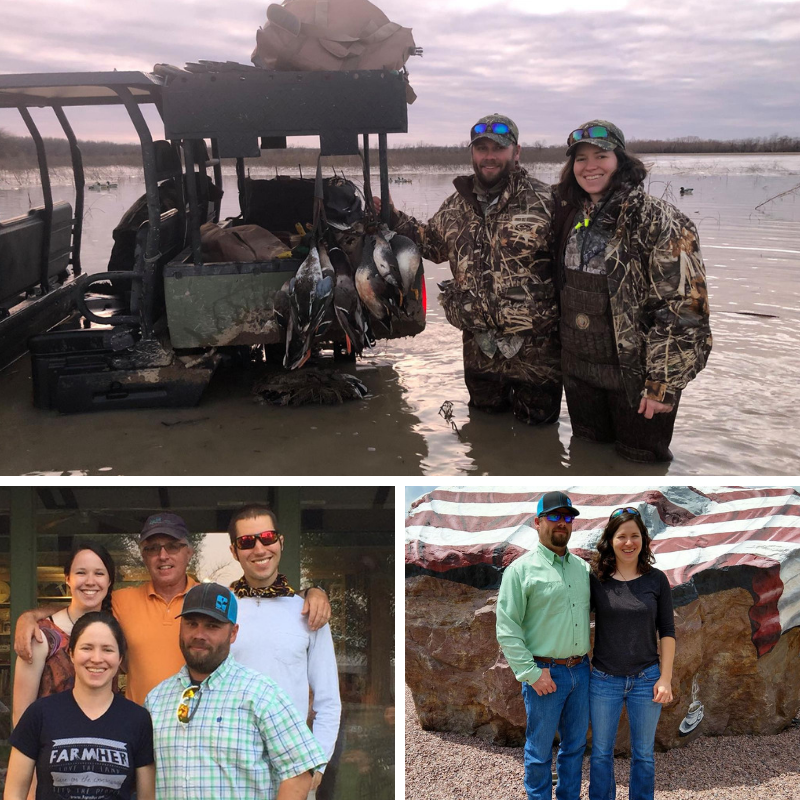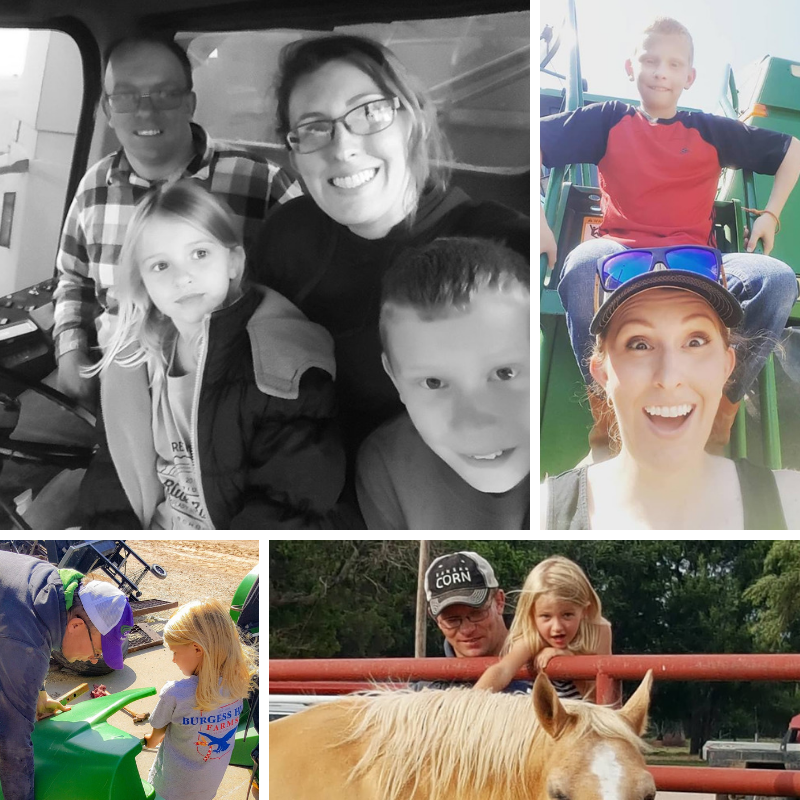Farm Families:
Surviving the Season: Tips and Advice from Farm Families Across the State
Blog Posts by Kaitlin Donovan
For most farmers across Kansas #harvest18 has finally come to an end. This year’s growing season and harvest seemed more stressful than normal. We caught up with farm families across the state to talk about how they “survive the season” and manage the stress of farming and families. These are their stories.

The Allens; photos courtesy of Alicia Allen.
David and Alicia Allen
David and Alicia Allen got married in April 2016 and now work together on Alicia’s family’s farm in Wallace county in west central Kansas. Before they returned back to help on the farm Alicia’s dad just hired out all the field work because he had too much to do and not enough time. But now that Alicia, David and Alicia’s older brother are back to help they have been transitioning into taking back those responsibilities and developing a management system for themselves and their employees. Which can create some additional stress that other farms might not have. They still hire custom harvesters because they have their own grain storage facility to keep them busy during harvest times.
“During planting season it’s all hands-on-deck,” Alicia says. In order to get all their acres planted according to schedule they plant in shifts over 24-hour periods. They also recently bought a new planter equipped with the latest precision technology to increase their efficiency. With this new planter and the all day shifts they hope to plant the same number of acres in one week that used to take them four to six weeks to plant.
“We should be able to plant at a rate of ten to 12 miles per hour if it’s a smooth field,” she says. “I think the biggest time consumption is just moving from field to field because the new planter is so heavy that is has to be put on tracks, so we can’t go any faster than like 15 miles per hour. And our land is also so spread out that at that speed it could take us six hours if we traveled from our furthest north field to our most southern field.”
She says the biggest thing that helps them during these stressful times is supporting each other. When Alicia is doing the night shift of planting and David is still working days they often will trade off and help each other with the many different chores around the house. And then to unwind they always plan a trip of some kind to go on together, as a reward to themselves for making it through the busy season.
As if the first couple years of marriage aren’t already hard enough, working together on the family farm adds a little more stress to the situation. Recognizing this, Alicia has reached out and enlisted the help of a life coach that she meets with virtually. Through this resource she is gaining advice on how to approach conversations between her and David and see situation in a point of view that will help them both as partners in marriage and in the farming operation.
“I would recommend it to other couples in similar situations,” says Alicia. “I think it’s important strengthen these communication skills before moving on in your marriage, such as having kids. I’m learning how to better approach conversations between David and I. And I think it goes a long way, not letting the everyday things just continue without being addressed and approaching them in a way that makes the other person feel valued and appreciated. I think you have to believe that life can be better than it is, even if its great, you have to keep imagining and striving for how much better it can be.”
The are also participants in the Class 2 of the Kansas Corn Corps young farmer program, which they have really enjoyed.
“Just having those discussion topics that don’t normally get brought up in everyday life is important,” says Alicia. “Confronting them and having actual time set aside to discuss them has been really good for us. I think if you’re going to go through the Corn Corp program you should definitely do it with your spouse.”
Structure plays a large role in their family farm and they give themselves titled and do their best to organize their responsibilities accordingly like any other business. Alicia describes the system in terms of sandboxes and everyone on the farm has their own sandbox. She says that especially in the management roles, you’ve got to have a defined area that you’re in charge of and it’s important for family members to not get into each others’ sandboxes. You have to trust that the other person is able to do their job and then let them, which is something her family used to struggle with but now they are better than they were.
Consistent meetings before and after peak times of the growing season like planting and harvest are also one way that Alicia and her family are trying to do a better job relieving some of the stress. For pre-planting they meet and discuss the planting schedule, crop plans, responsibilities, how inventory will be accounted for and the communication plan for getting information from the field to the office. Then after planting, ideally within a week or so, we meet to discuss what went well and what needs to change for the next year. As the human resources manager for the farm, strong communication among employees is something Alicia emphasizes for the farm’s success.
“Roles are really important,” she says. “In fact, we have been putting together job descriptions for everyone on the farm, especially the hired hands before hiring, because they are the ones that need division. We as family members need division too but it comes more naturally to us than the employees, giving them job descriptions is very important and while we haven’t finalized ours yet, everyone does have a title.”
Family business are hard but Alicia says if you want it to remain in the family and grow the business then you have to treat it like a business. Defining the roles is one way to do that. Then there’s less room for interpretations, which can lead to hurt feels and conflict. If you have pre-established roles then when someone starts trying to do your job you can say, “this is my sandbox,” and they can take their shove and pail back to their own.

The Wyrill Family; photos courtesy of Jessie Wyrill.
Jake and Jessie Wyrill
Jake and Jessie Wyrill raise their two kids on the same land where Jake grew up farming in Phillips County in north central Kansas. Their farm consists of six separate families, with the main operators being Jake along with his father, brother, uncle, and two cousins. The wives do daily office work and according to Jessie, make gourmet meals for everyone during harvest. She says she is blessed because they are now able to start watching the next generation of Wyrill’s start helping on the farm too.
The busiest times for them are May, June and July because of corn and soybean planting along with wheat harvest. And then after a somewhat quiet August they pick back up again in late September until November for wheat planting and fall harvest of corn and soybeans.
Jessie says the long hours are the biggest cause of stress for their little family. The addition of their son this spring has made planting season a little bit more interesting. They finally had it all figured out their toddler and then they decided to add a newborn to the organized chaos that is farm life.
“Our daughter is very attached to her daddy,” Jessie says. “She rides in the tractor with him as much as possible when he is close to home. Once he has moved away from the home area, we don’t get to have lunch together so she doesn’t get to ride with him. That means no break for mommy and no daddy time for our girl. Everyone gets grumpy with that schedule.”
During these times when Jake is spending long hours in the fields, Jessie let’s her daughter stay up a little later at night so she can see her daddy before bed. But shhhh, don’t tell Lexi she get’s to stay up, Jessie says she still thinks she has her normal bedtime. Even though planting throws a loop the family’s normal plans Jessie says they try hard to keep their normal schedule so Lexi doesn’t get too stressed. For the most part they just adding trips to the field and then take later/longer naps to offset the later bedtime.
“The best thing we ever did was get a high back booster for her to sit in while riding in the combine or tractor,” Jessie says. “It gives her extra support when it gets bumpy or when the bumps lull her to sleep. Plus, the one we have gives her 2 cup holders for her snacks and drink. As a 2 year-old, she rode for seven hours in the combine with few complaints!”
When it comes to Jake and Jessie keeping their own sanity during these stressful time, as both farmers and parents, they always try to make time for each other. At night when Jake gets home from the field and the kids are asleep they take time to do something together. Sometimes we just talk about the day for a few minutes and other times we watch one of our favorite shows together. She says it helps them both wind down and relieve stress on those busy days.

The Burgess Family; photos courtesy of Jenny Burgess, Burgess Hill Farms.
Geoff and Jenny Burgess
Geoff and Jenny Burgess farm 2,100 dryland acres in Reno and Rice counties. They have two kids ages four and eleven. To supplement their income they also run an equipment repair business.
“Geoff and I do all the work,” says Jenny, “but we do hire out as needed during the busy seasons. Our kids are too young to do too much on the farm. Though, our 11 year-old thinks he can do it all.”
The end of April marks the start of their busy season and Jenny says that unless it rains, it seems as if the busy season never stops. She says planting, spraying, working ground and managing the day-to-day operations is a never ending cycle from spring to early winter when the last of their crops finally makes it into the grain bin.
“Weather and working 120 hours per week sometimes makes it stressful on family,” Jenny shares. “But, we take the time to take the kids along so they can at least see us. Mother Nature, markets, and just trying to keep our first-generation farm going is a challenge at times.”
She hates to say it, but sometimes the farm does come first. But she describes her farm kids are amazingly resilient and can adapt to the go, go, go of the farm life. She also credits her parents for helping out “immensely” with the kids.
“I honestly don’t know how we do it,” says Jenny. “We just do.”
Jenny says her coping mechanism for stress is a little different the Geoff’s. Her stress relief is getting off the farm just for a few days to “hit the restart button.”
Geoff releases his stress working in the shop fixing farm equipment and tinkering, which is nice because it also means cheap repair costs when their own equipment breaks down. Break downs are often a very stressful time for farmers. Jokingly, Geoff also says he eats his stress, but how many of us haven’t?
